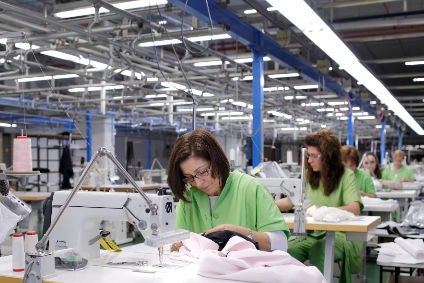
Inditex, owner of the Zara and Bershka brands, has joined hands with the IndustriAll Global Union in a commitment to support the economic and social recovery of the global garment industry from the Covid-19 crisis.
The move sees Inditex and IndustriAll, which represents some 55m workers, reinforce their longstanding cooperation with the signing of a joint declaration in Arteixo, Spain, and Geneva, Switzerland, yesterday (4 August).
It builds on a longstanding partnership between the company and the global union, which began with a global framework agreement (GFA) signed in 2007 and renewed in 2019.
GFAs are designed to protect the interests of workers employed in all operations of the multinational companies who sign them, and are negotiated at a global level between trade unions and companies. They establish best standards on trade union rights, on health and safety, and on the labour relations principles adhered to by the company in its global operations, regardless of the standards existing in a particular country.
The joint declaration pledges to respect freedom of association and collective bargaining rights, giving workers the right to join a union to advance their interests. It promotes social dialogue at all levels, and commits both organisations to working with governments and business organisations in source countries.
“Both Inditex and IndustriAll, through this joint statement, express their commitment to contribute to the economic recovery of garment industry and the security of workers in Inditex’s and the global garment supply chain, according to their respective roles,” the document reads. “Furthermore, both organisations call on other international and national stakeholders to commit to this goal thereby contributing to the global economic and social recovery.”
In many countries that produce garments for the sector, there have been large scale job losses and economic hardship for workers. The agreement deepens Inditex’s longstanding commitment to freedom of association and collective bargaining rights and social dialogue, in addition to enhancing Inditex’s commitment to stable payment terms and to broader access to financing for suppliers in order to support their cash flow. This enables them to honour payments to workers so that jobs and incomes are protected.
The document also reinforces commitments to other multi-stakeholder initiatives, including the International Labor Organization (ILO) Call to Action in the Global Garment Industry and the Action Collaboration Transformation (ACT) initiative.
Meanwhile, the health and safety of workers will be ensured with supplier companies implementing protective measures, and providing personal protective equipment. As Covid-19 restrictions are lifted and economies reopen, Inditex and the global union committee will monitor the safe resumption of normal operations.
“Our priority through this crisis has been and continues to be the health and safety of our people, the workers in our supply chain and our customers,” says Inditex executive chairman Pablo Isla.
“Our longstanding and fruitful work with IndustriAll for over 13 years makes our framework agreement a strong tool to keep working to protect and promote workers’ rights and well- being, while supporting the global garment industry during these unprecedented times.”
Inditex is one of the world’s largest fashion retailers, with eight brands – Zara, Pull&Bear, Massimo Dutti, Bershka, Stradivarius, Oysho, Zara Home and Uterqüe – selling in 202 markets through its online platform or its more than 7,000 stores in 96 markets.
IndustriAll Global Union general secretary, Valter Sanches, adds: “The Covid-19 pandemic caused a crisis in the textile and garment industry that led unions to experience mass job losses, unsafe working conditions and attacks on workers’ rights. Many of our members saw their livelihoods collapse entirely.
“The manufacturing suppliers need stability and predictability so that employment and income can be preserved. That’s what this commitment entails. We are working together to help the industry to develop the resilience to recover from the crisis, saving jobs and preserving the rights and income of workers.”



